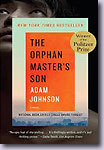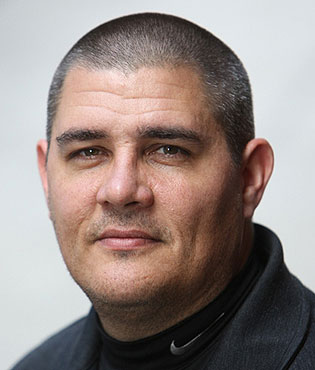

The Orphan Master’┐Įs Son
’┐ĮIf a man and his story are in conflict, it is the man who must change,’┐Į we are told in Adam Johnson’┐Įs
important, intricately layered novel, The Orphan Master’┐Įs Son.
Here Adam Johnson has written a life story of a soul in the world ’┐Į or two life stories, as one is the story
of Jun Do as constructed by his country, and the other is Jun Do under his own steam, an individual man in
a harsh time. Jun Do is raised in a punishing North Korean orphanage and the vicissitudes of his struggle
forward take us through all of the resolute darkness of our age. He commences with mandated crimes, kidnapping
Japanese citizens, an opera singer, all at the pleasure of the national power, the Dear Leader. The story as
it deepens and moves through eye-widening outrages with operatic virtuosity also never succumbs to the
temptation to become inflated or polemic. The story stays close to Jun Do’┐Įs journey from a radio operator
on a fishing vessel to his role as false ambassador on the classic state mission to Texas, an Americana which
rings in its own way of jingoism and harm. Johnson captures vivid, often horrifying episodes with his measured
but unflinching prose. His protagonist climbs, story by story, to the upper levels of power. The diplomacy
between the two countries is an exchange of veiled ’┐Į and not so veiled’┐Įinsults and it all returns Jun Do to his
punishing homeland with a new identity and a double life which, rife with jeopardy and pain, deepens even
further the complications of National character’┐Įone constructed by one’┐Įs country -in conflict with individual
character.
Everywhere in this novel is evidence of a vivid and muscular imagination. A nation, any nation, that lies
to its people is forever at war. At war with itself. This important book exemplifies the great features of
literary storytelling in small but ringingly suggestive human moments lived under the constant pressure of
a government’┐Įs crushing and many times arbitrary force.
’┐Į Michelle Latiolais
2013 finalist judge
* * *
Excerpt from the book
"There is a talk that every father has with his son in which he brings the child to
understand that there are ways we must act, things we must say. But inside, we are
still us. We are still family. I was eight when my father had this talk with me. We
were under a tree on Moranbong Hill. He told me that there was a path set out for us.
On it, we had to do everything the signs commanded and heed all the announcements
along the way. Even if we walked this path side by side, he said, we must act alone
on the outside, while on the inside we would still be holding hands."

|
|
 |

2013 Fiction Winner


(Click photo to see acceptance speech at awards dinner.)
Adam Johnson
The Orphan Master’┐Įs Son
’┐ĮThe first step toward peace is listening. In researching the Democratic People’┐Įs Republic of Korea,
I heard the stories of many defectors, each of whom told similar tales: that in North Korea, to reveal
event the simplest personal thought was to invite dangerous scrutiny from the state. I came to understand
that few people on earth have been rendered as voiceless as those born under the Kim regime. After a
legacy of occupation, subjugation, partition and war, the resilient citizens of North Korea were greeted
with six decades of a cruel and controlling totalitarian dictatorship. For more than a century, Korean
literature has been outlawed in the North, and as a result, citizens of the DPRK are five generations
removed from their literary tradition. They have never read a book that wasn’┐Įt censored, state-approved
and designed solely to glorify either their Japanese occupiers or the Kim leadership. While writing The
Orphan Master’┐Įs Son, I found myself asking a simple question: Who was I to speak for a group whose
experience was so far from my own? But after hearing the stories of defectors who, even after gaining
freedom, were afraid to criticize Kim Jong-il, I started wondering: Why don’┐Įt more people attempt to
lend voice to those from whom it has been stolen? One of the purposes of the Dayton Literary Peace Prize,
in my estimation, is to serve as an invitation for writers to do just that, and it is my great honor
to have written a book worthy of being counted among others who have attempted such an important task.’┐Į
’┐Į Adam Johnson
ADAM JOHNSON is a novelist and short story writer, whose work has received wide acclaim, including the
2013 Pulitzer Prize for The Orphan Master's Son. New York Times critic Michiko Kakutani called
the bestselling work "a novel that not only opens a frightening window on the mysterious kingdom of North
Korea, but one that also excavates the very meaning of love and sacrifice."
Johnson also is the author of Emporium, a short story collection, and the novel, Parasites Like
Us, which won a California Book Award in 2003. Recognition for his work includes a Whiting Writers'
Award, a Swarthout Writing Award, and the 2010 Gina Berriault Literary Award. He has received a National
Endowment for the Arts Fellowship, a Stegner Fellowship and a Kingsbury Fellowship. In 2002, Amazon.com
named Johnson Debut Writer of the Year.
A native of South Dakota, Johnson teaches creative writing at Stanford University. His fiction has appeared
in Esquire, The Paris Review, Harper’┐Įs, Tin House, Granta, and Playboy, as well as The Best
American Short Stories. He lives in San Francisco.
|
|